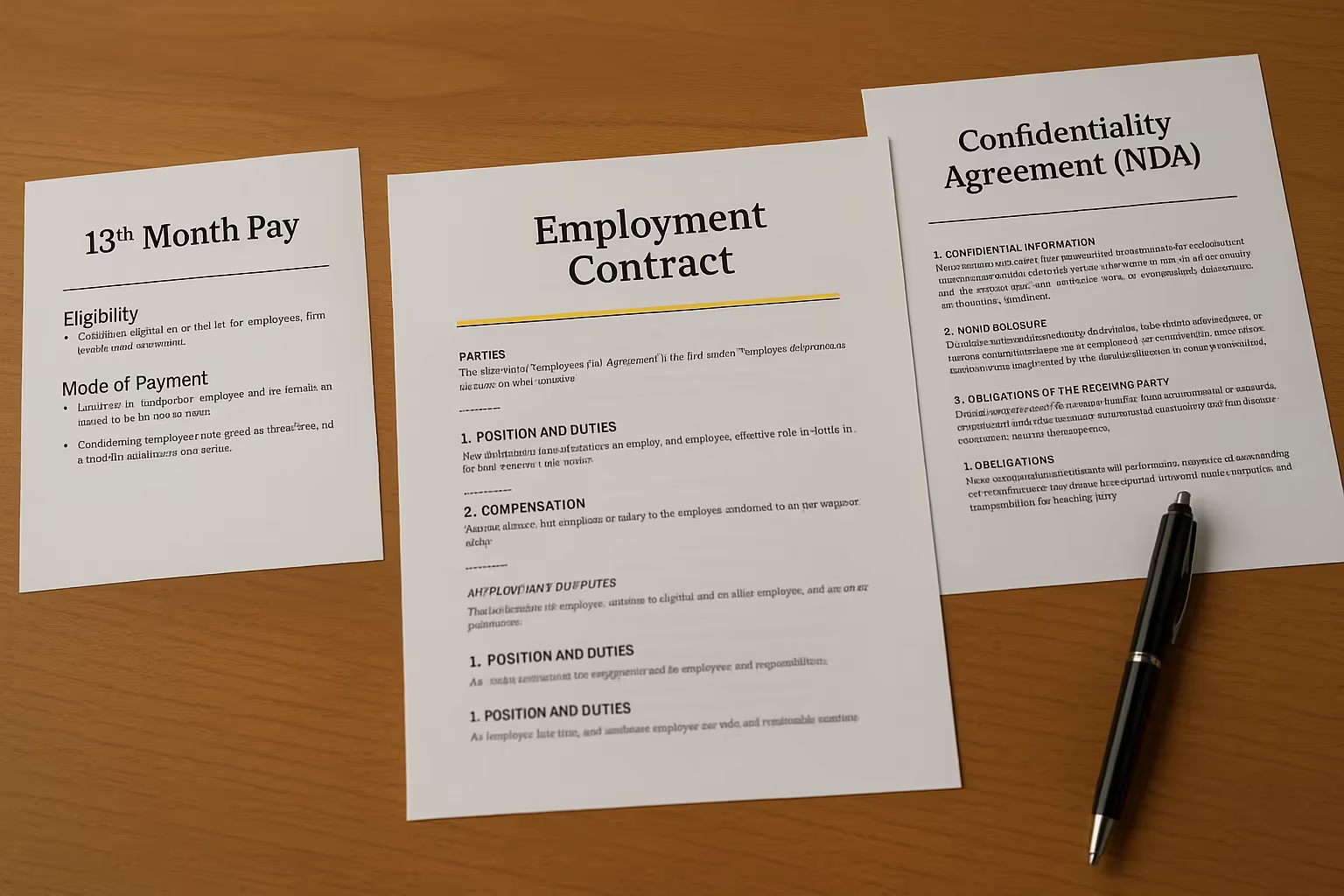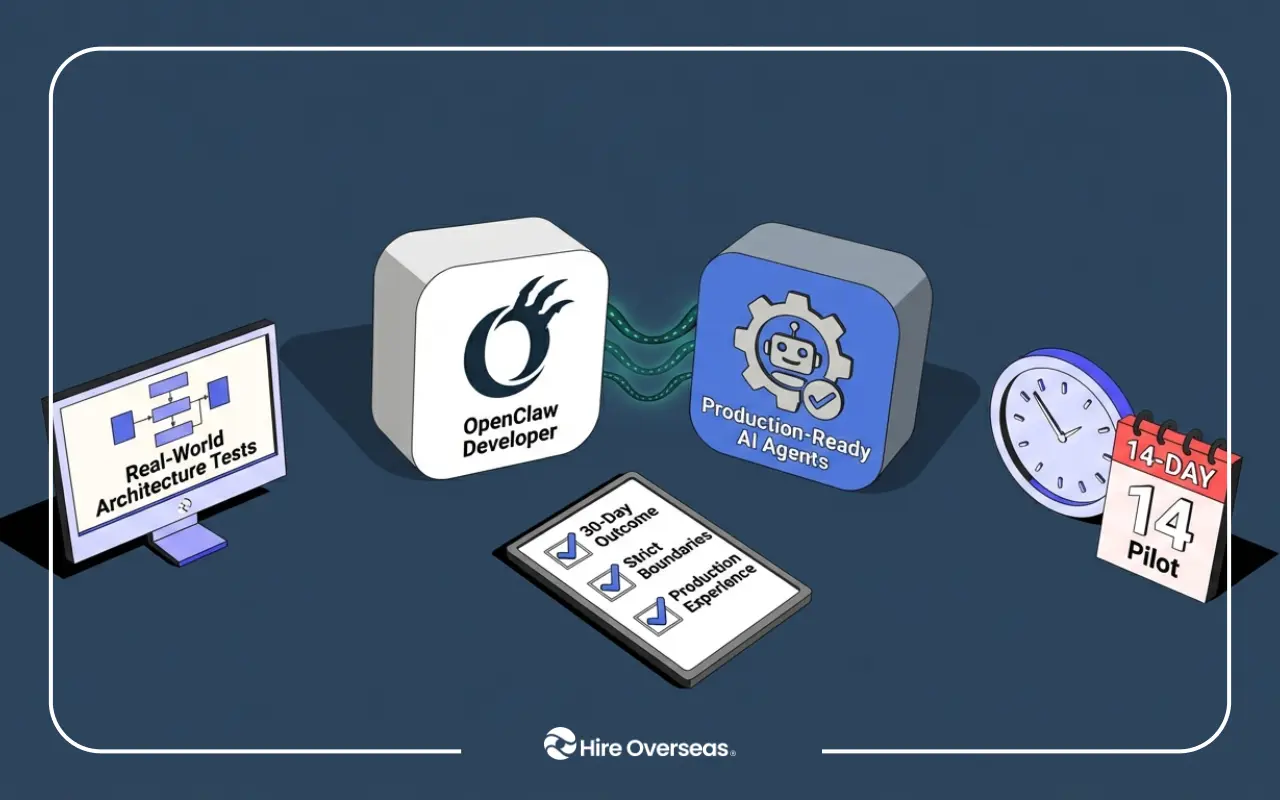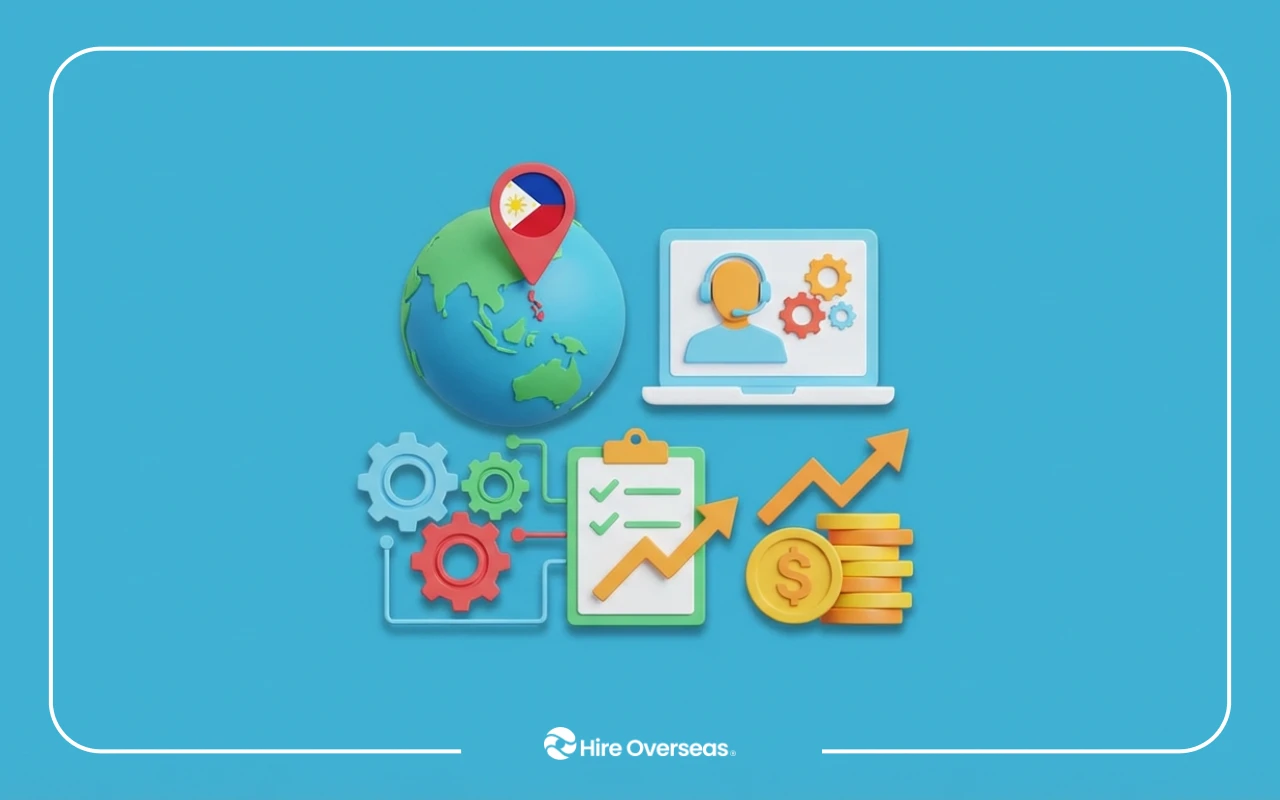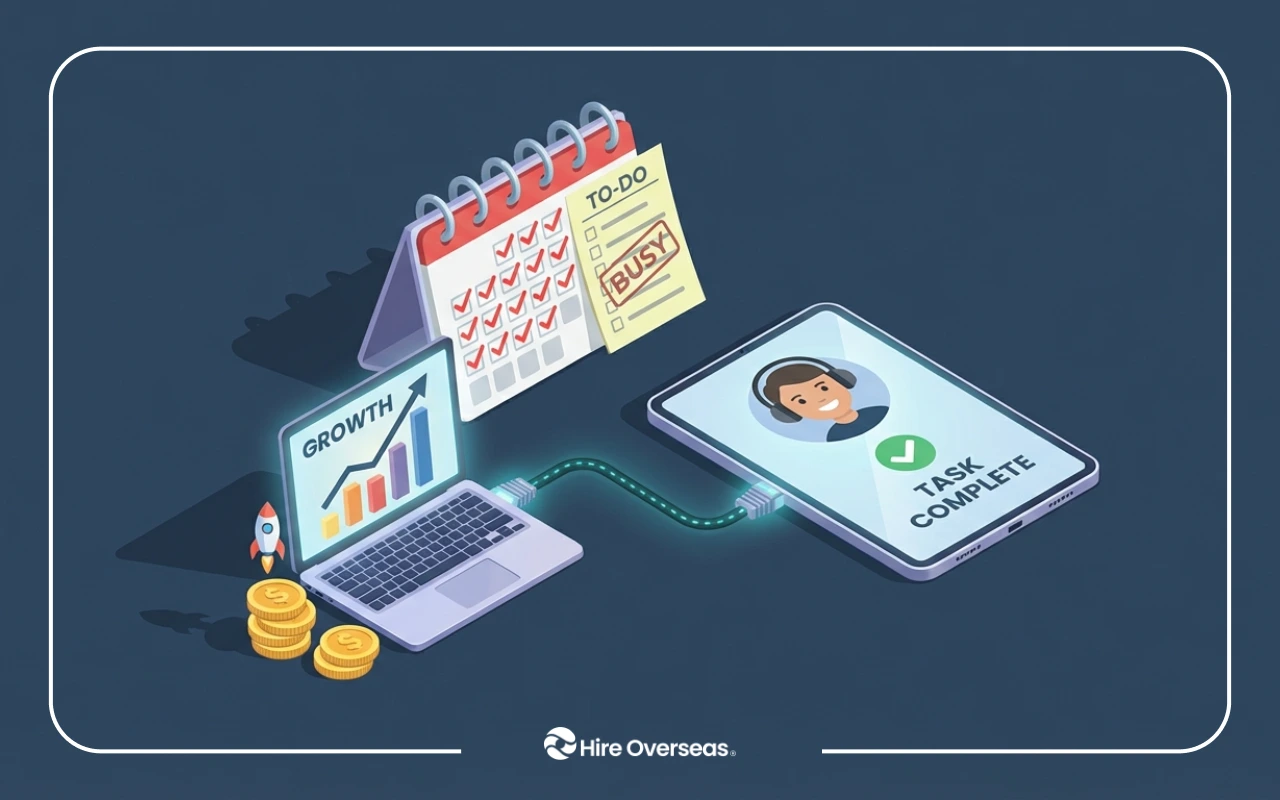The Smart Way to Hire Filipino Talent for Your Remote Team

Why Companies Are Hiring in the Philippines
Companies continue to hire in the Philippines because it offers a strong combination of language skills, relevant experience, affordability, and work reliability.

English proficiency
English is the second official language and is used in schools, media, and business. Filipino hires can write client emails, join video calls, and manage documentation without translation tools or hand-holding.
Cultural compatibility
Filipino professionals are familiar with U.S. and Western workplace culture. They’re comfortable using tools like Slack, Notion, or HubSpot, and often mirror the tone and communication style of American or Australian teams.
Access to trained, remote-ready talent
You’ll find skilled professionals in roles like:
- Virtual assistants handling inboxes and calendars
- Bookkeepers trained in QuickBooks or Xero
- Developers familiar with React, PHP, and WordPress
- Designers using Figma, Canva, or Adobe Creative Suite
Many have previous experience working with international clients, agencies, or outsourcing firms.
Competitive cost without sacrificing quality
Full-time VAs start around $600–$800/month, mid-level marketing or customer support at $900–$1,200, and developers or designers at $1,500–$2,000+. These are market-aligned rates for the Philippines — not underpayment.
Time zone coverage
With a 12–15 hour difference from the U.S., Filipino workers can handle tasks overnight. Many teams use this for customer support, order processing, or backend tasks while the main office is offline.
Retention and work ethic
Most Filipino professionals prefer long-term, stable roles. If paid fairly and managed well, they’ll stay for years. It's common to see 2–5 year tenures with offshore employers when relationships are built on trust and structure.

Know What You Need Before Hiring
So you're ready to hire someone from the Philippines—but hold up, what's the real reason? Hiring without clear goals is like grocery shopping hungry: you end up with a cart full of chips but still nothing for dinner.
Pinpoint Your Actual Problem
Ask yourself honestly: what's causing the stress?
- Is your inbox overflowing with unanswered emails?
- Are financial records lagging weeks behind?
- Has your Instagram turned into a ghost town?
What Kind of Help Makes Sense?
Now that you know your core problem, what type of hire is best?
- Full-time hires are great if tasks constantly pile up. Think customer support, operations, or daily content creation.
- Part-time hires work for regular but manageable tasks. A bookkeeper might only need 10 hours weekly.
- Project-based hires are ideal for short-term or seasonal projects. Migrating a website? Editing video content? Get a specialist to tackle these one-off jobs efficiently.
Remember this simple rule: if the issue recurs weekly, find regular support. For temporary chaos, bring in targeted help.
Clear Expectations = Better Results
You don't need to write a novel-sized SOP overnight, but you do need clarity. Spell out these basics:
- What's their main role?
- What specific results do you expect after 30, 60, and 90 days?
- Which tools will they need?
- Who do they report to and when should they be available?
Set practical KPIs like:
- "Answer customer emails within 6 hours."
- "Post three engaging social media updates weekly."
Don't Skip Onboarding
This is where things typically fall apart—great hire, lousy onboarding. Throwing someone into tasks without guidance isn't setting them up to succeed.
Onboarding doesn't have to be fancy, but it does have to happen. Loom videos, Slack intros, simple task lists—all these little things help your new hire feel confident. Filipino professionals are adaptable, but nobody reads minds. Give them clear instructions, and you'll get better results.
Choose the Right Hiring Model
You've nailed down what you need. Now let's figure out how to actually get your person onboard, without spending your weekend googling Filipino tax laws.
You've got three solid options. Each fits a different situation—depending on your budget, patience for admin stuff, and how hands-on you wanna be.
Freelance Hiring
You do it all yourself—find, vet, and pay directly. Great if you love control and hate extra fees. Places like Upwork, OnlineJobs.ph, or referrals work wonders here.
It's cheap and fast but you will have to handle contracts, payroll, time tracking, and deal with hiccups solo.
Employer of Record (EOR)
An EOR is basically your shortcut through the legal maze. They officially employ your hire so you don't need your own entity overseas. Taxes, payroll, and compliance? That's on them.
It's pricier—but worth it if you want to build a small, stable team minus headaches. You just hand over the work; they handle the boring stuff.
Offshore Staffing Partner (like us)
This one's your sweet spot between DIY and full-service. We source, screen, manage contracts and payroll, plus smooth out onboarding. All you do is slot the new hire into your workflow.
If scaling quickly feels intimidating—or if overseas hiring is brand new to you—this makes life easier. No more frantic spreadsheeting or guesswork. You're covered.
Understand Labor Laws and Compliance

Legal stuff isn't exciting, sure, but ignoring it can bite you later. Let’s keep this quick and practical.
Contractor vs Employee: The Gray Zone
Typically, freelancers and contractors are straightforward—no full employee benefits needed. But watch out: if they have fixed hours, report directly to you, or become your only hire for a key role, local law might classify them as employees.
That's exactly where EORs or staffing partners save your sanity. They handle the fine print, keeping you safely away from fuzzy legal lines.
Holidays, Hours, and Benefits
In the Philippines, employees get certain standard perks:
- 13th-month pay (annual bonus)
- Paid public holidays
- Night shift differential for graveyard shifts
Do you technically have to provide all this? Maybe not—but treating people fairly is smart business. Especially around big holidays like Christmas and Holy Week. Respect goes a long way.
Keeping Things Private
Simple rules: NDAs, secure data storage, and clearly communicated expectations about confidentiality. Most Filipino hires already take this seriously—but clarity never hurts.
Do I Need to Register My Business Locally?
Nope. Not for freelancers or when using staffing solutions. Only if you're going big—like setting up an actual branch office or hiring directly under your own local entity. Honestly, that's uncommon unless you're in aggressive growth mode.
Interviewing and Vetting Filipino Talent
You’ve shortlisted a few candidates—now it’s time for interviews. Don’t aim for formality; aim for honesty and real connection. You’re not just assessing skills, but fit. Can they communicate clearly? Do they ask smart questions? Are they reliable, the type to update you on Slack without reminders?
Look beyond the resume
Filipino professionals often understate their achievements, so dig deeper: ask about real challenges, past experiences, and what they’d do differently next time. Focus on how they communicate—do they explain clearly, admit what they don’t know, or just nod along?
Try skill-based assessments
For roles like video editing, bookkeeping, or customer support, short tasks or timed tests reveal more than portfolios. A one-hour trial now can prevent weeks of headaches later.
Make it async-friendly
Don’t force live interviews at odd hours—send recorded questions and let them respond by video or in writing. You’ll see how they handle independent problem-solving, essential for autonomous roles.
A few red flags to watch for
- Vague answers with zero examples
- Poor written communication (especially for admin or support roles)
- Overpromising without clear boundaries
- Discomfort around feedback or revisions
You’re not looking for perfection. You’re looking for consistency, honesty, and someone who feels like a teammate, not just a transaction.
Best Practices for Long-Term Retention
Getting someone hired is only half the battle. The real magic happens after the contract’s signed. If you want someone to stick around, do more than just give them tasks — give them a reason to care.
Build loyalty the slow, steady way
Filipino professionals value genuine connection: regular check-ins and thank-you's matter. You don’t need deep friendship—just humanity. Schedule consistent catch-ups, not just performance reviews, and create space for honest conversation. When people feel seen, they engage.
Offer growth
You don’t need a rigid ladder; just offer chances to learn, take on new challenges, or mentor. Learning and trust drive retention. Bonuses—no matter how small—recognize effort and boost morale.
Avoid burnout
Use time zones wisely, but don’t enforce constant night shifts. Rotate schedules, clarify off-hours, and encourage real breaks—even if they claim to be fine. Overwork drives churn; retention is cheaper than rehiring.
Know when to part ways
If it’s not working out, handle exits with honesty and respect. Give notice, settle up fairly, and never ghost. How you end relationships is as important as how you begin.
Hire Smart, Hire Global
Building a remote team doesn’t have to be complicated. It doesn’t have to be expensive. And it definitely doesn’t have to be hit-or-miss.
The Philippines continues to be one of the smartest places to hire for a reason — skilled professionals, strong work ethic, excellent communication, and a culture that blends with Western workflows like it was built for it.
You get more done. You sleep better. You scale without breaking the bank.
Ready to build your offshore team?
Let Hire Overseas handle everything — from sourcing to payroll to retention. You’ll get great talent without the growing pains.
Let’s make remote work, work.
Unlock Global Talent with Ease
Hire Overseas streamlines your hiring process from start to finish, connecting you with top global talent.
Unlock Global Talent with Ease
Hire Overseas streamlines your hiring process from start to finish, connecting you with top global talent.





